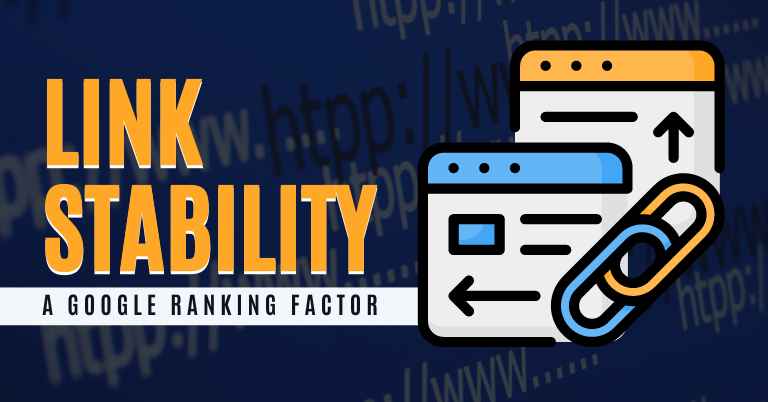Link stability is not a confirmed Google ranking factor. However, the stability of external links remains crucial for website credibility and domain authority.
In the competitive realm of search engine optimization (SEO), website owners and marketers are constantly striving to understand the factors that influence search engine rankings. One such aspect of SEO that often sparks debate is the role of link stability.
Link stability is the backbone of a robust SEO strategy, ensuring that your website maintains its integrity amidst the ever-shifting digital landscape.
While Google has not officially confirmed link stability as a ranking factor, it still holds significance for website reputation and visibility. External links, also known as backlinks, play a critical role in determining the authority and credibility of a website. In simple terms, backlinks are when other websites hyperlink to your site, indicating to search engines that your content is valuable and trustworthy.
However, the stability of these links remains an important consideration. If a website loses a significant number of backlinks over time, it may signal a drop in reputation or relevancy, which can potentially impact search engine rankings. While link stability may not be an explicit factor in Google’s algorithm, maintaining a healthy and consistent backlink profile can positively influence search rankings. As search engines strive to deliver the most relevant and authoritative results to users, having a stable network of external links can enhance a website’s visibility and credibility. Therefore, while link stability may not directly impact rankings, it remains an essential component of an effective SEO strategy.
Let's See the Topic Overview
The Importance Of Link Stability In SEO
When it comes to improving your website’s search engine ranking, one of the key factors to consider is the stability of your backlinks. In the world of SEO, link stability refers to the consistency and reliability of your backlink profile over time. Search engines like Google consider link stability as an important ranking factor because it indicates the trustworthiness and authority of your website.
The Role Of Backlinks In Search Engine Ranking
Backlinks play a crucial role in determining the visibility of your website in search engine results. These are links from other websites that point back to your site. Search engines see backlinks as a vote of confidence in your website’s credibility and relevance. The more high-quality backlinks you have, the more authority your website gains in the eyes of search engines, ultimately leading to higher rankings.
Understanding The Concept Of Link Stability
Link stability refers to the consistent presence of backlinks pointing to your website over time. It means that the links pointing to your site should remain active and not disappear or fluctuate excessively. Search engines consider link stability to determine the reliability and trustworthiness of your website. A stable backlink profile indicates that your website is a valuable resource that consistently attracts links from other reputable sites.
Exploring The Factors That Impact Link Stability
Several factors can impact the stability of your backlinks. These factors include:
- The longevity of the linking website: Backlinks from established and reputable websites tend to be more stable than those from newer or less reputable sites.
- The relevance of the linking website: Backlinks from websites in a similar niche or industry are more likely to remain stable over time.
- The quality and authority of the linking website: Backlinks from authoritative websites with a high domain authority are generally more stable.
- The natural link-building process: Backlinks obtained through natural and organic link-building techniques are more likely to be stable compared to those obtained through manipulative or spammy tactics.
By ensuring that these factors are taken into consideration, you can improve the stability of your backlink profile and enhance your website’s overall SEO performance.
Link Stability And Its Impact On Organic Rankings
Link stability has been a topic of interest among SEO professionals and website owners who strive to improve their organic rankings. But what exactly is link stability, and does it play a role in how search engines like Google determine where a website should rank in search results?
Analyzing Google’s Stance On Link Stability As A Ranking Factor
When it comes to understanding Google’s stance on link stability as a ranking factor, it’s important to look at the information provided by the search engine itself. Google has always placed a strong emphasis on user experience and providing relevant, high-quality search results. While Google hasn’t explicitly stated that link stability is a direct ranking factor, there are indications that it could indirectly influence organic rankings.
The Correlation Between Link Stability And Organic Search Performance
There is a correlation between link stability and organic search performance, which can be observed through various SEO studies and analyses. The stability of links refers to the consistency in the presence and quality of backlinks over time. When a website’s backlink profile remains stable and shows a consistent growth pattern, it indicates to search engines that the website is trusted and valued by other online sources.
One of the reasons why link stability is important is that it helps search engines understand the overall authority and credibility of a website. When search engines see that a website consistently attracts new backlinks and maintains existing ones, it signals that the website offers valuable content and is worthy of higher rankings. On the other hand, if a website experiences frequent fluctuations in its backlink profile or loses trusted backlinks, it may give search engines the impression that the website’s content or authority has diminished.
Case Studies And Research On The Impact Of Link Stability On Rankings
Several case studies and research have shed light on the impact of link stability on organic rankings. One such study conducted by digital marketing experts analyzed the backlink profiles of a group of websites over a period of six months. The study revealed that websites with stable and consistent growth in their backlink profiles experienced significant improvements in their search rankings, while those with volatile or declining backlink profiles faced a drop in rankings.
Another research study focused on websites in highly competitive niches and found that those with stable link profiles were more likely to rank higher in organic search results. The study attributed this correlation to the fact that search engines tend to value reliable and consistent signals of authority and relevance, which can be reflected in the stability of a website’s backlink profile.
In conclusion, while link stability may not be explicitly confirmed as a direct ranking factor by Google, there is evidence to suggest its impact on organic rankings. By maintaining a stable and growing backlink profile, website owners can signal trust, authority, and relevance to search engines, potentially leading to improved organic search performance.
Factors Affecting Link Stability
Link stability is a crucial aspect of search engine optimization. When it comes to Google rankings, link stability plays a significant role in establishing the authority and trustworthiness of a website. It determines how search engines perceive the value and relevance of the site’s links. Understanding the factors that affect link stability can help website owners and SEO professionals create a solid link-building strategy that yields results.
Website Authority And Trustworthiness
The authority and trustworthiness of a website are essential factors that influence link stability. Search engines consider credible and authoritative websites to be more stable as they are less likely to engage in link manipulation or spammy practices. Websites with a strong reputation are more likely to attract quality links from other trustworthy sources. For a website to build and maintain link stability, it is crucial to establish authority and trustworthiness through high-quality content, positive user experiences, and ethical SEO practices.
Frequency Of Link Updates
The frequency of link updates also plays a significant role in link stability. Websites that frequently update their content and add new links tend to have higher link stability. This is because search engines perceive regular updates as a sign of an active and relevant website. On the other hand, websites with outdated or rarely updated links may experience a decline in link stability. To enhance link stability, website owners should regularly review and update their backlink profile, ensuring that outdated or low-quality links are replaced or removed.
Link Sources And Their Credibility
One of the critical aspects that influence link stability is the credibility of the sources from which the links originate. Search engines assign more value to links coming from reputable and trustworthy websites. These links are seen as an endorsement of the website’s content and contribute to its stability. Conversely, links from questionable or unreliable sources can negatively impact link stability and may even lead to penalties. It is essential to focus on acquiring links from high-quality and relevant sources to ensure long-term link stability.
The Influence Of Link Relevance On Stability
The relevance of the links to the website’s content and industry is another crucial factor that affects link stability. Search engines prioritize links that are contextually relevant to the website’s topic or niche. Relevant links signal to search engines that the website offers valuable information and contributes to its overall stability. On the other hand, irrelevant or spammy links can harm link stability and result in a lower ranking position. Ensuring that links are not only from reliable sources but also relevant to the website’s content is vital in building and maintaining link stability.
Strategies To Achieve Link Stability
Link stability is an important factor in the world of search engine optimization (SEO) as it can greatly impact your website’s ranking on Google. When the search engine’s algorithms detect a consistent and stable link profile, it sends a positive signal that can increase your website’s visibility and authority. To achieve link stability, it is essential to implement effective strategies that focus on building a diverse and natural backlink profile, proactively monitoring and managing backlinks, and establishing relationships with reputable websites for long-term link stability.
Building A Diverse And Natural Backlink Profile
One of the key strategies to achieve link stability is by building a diverse and natural backlink profile for your website. This means acquiring backlinks from various sources and ensuring that they are relevant to your content and industry. Google values quality over quantity when it comes to backlinks, so it’s crucial to focus on obtaining links from authoritative and trustworthy websites that are related to your niche. Here are a few approaches you can take:
- Guest blogging: Reach out to other relevant blogs and offer to write a guest post in exchange for a backlink. This not only helps you gain exposure to a new audience but also gives you the opportunity to include a backlink to your site in the author bio or within the content itself.
- Resource link building: Create valuable and informative content, such as guides, tutorials, or infographics, that other websites in your industry may find useful. Reach out to these websites and offer your content as a resource, increasing the chances of them linking back to your site.
- Social media promotion: Leverage the power of social media to promote your content and attract organic backlinks. By sharing your content across relevant social media platforms, you increase its visibility and the likelihood of others linking to it.
Proactively Monitoring And Managing Backlinks
Another vital aspect of link stability is actively monitoring and managing your backlinks. It’s important to regularly check the quality and relevance of the links pointing to your site. If you discover any low-quality or spammy backlinks, take immediate action to disavow them using Google’s Disavow Tool. Additionally, keep an eye on your site’s overall backlink profile and make adjustments as needed to ensure it remains diverse and natural. Here are some steps you can follow:
- Perform regular backlink audits: Use tools like Ahrefs or Moz to conduct periodic audits and identify any potentially harmful backlinks.
- Disavow toxic backlinks: If you find any low-quality or spammy backlinks, create a disavow file and submit it to Google’s Disavow Tool.
- Request removal of irrelevant or harmful backlinks: Reach out to webmasters and request the removal of any irrelevant or harmful backlinks pointing to your site.
- Monitor referral traffic: Keep an eye on your referral traffic to identify any suspicious or unusual patterns that could indicate negative SEO tactics.
Establishing Relationships With Reputable Websites For Long-term Link Stability
Lastly, establishing long-term relationships with reputable websites is a highly effective strategy to ensure link stability. Building connections with others in your industry creates opportunities for natural link acquisition and collaboration. Here’s how you can establish these relationships:
- Participate in industry forums and communities: Engage with other professionals and experts in your niche by actively participating in industry forums, communities, and social media groups. Share your knowledge, offer valuable insights, and connect with like-minded individuals.
- Collaborate on content creation: Look for opportunities to collaborate with other reputable websites or influencers within your industry. This could involve co-authoring blog posts, creating podcasts or videos together, or hosting joint webinars.
- Offer testimonials or case studies: If you have positive experiences with products or services from other reputable websites, consider offering testimonials or case studies in exchange for a backlink. This not only showcases your expertise but also helps build trust and credibility.
By following these strategies, you can establish link stability for your website, which can positively impact your Google ranking and overall SEO efforts.
The Future Of Link Stability In SEO
As Google’s algorithms continue to evolve, the significance of link stability as a ranking factor becomes more prominent. Link stability refers to the consistency and longevity of links pointing to your website. In the past, the number of backlinks was considered crucial for search engine rankings. However, in recent years, Google has started emphasizing the quality and stability of these links, recognizing their role in determining a website’s credibility and authority.
The Evolving Nature Of Google’s Algorithms And The Significance Of Link Stability
Google’s algorithms are constantly evolving to provide users with the most relevant and reliable search results. The search engine giant now places a great deal of importance on link stability, considering it a strong indicator of a website’s trustworthiness and authority. When your website has a consistent and stable network of high-quality backlinks, Google interprets this as a vote of confidence from other reputable websites in your niche. This positively impacts your search engine rankings and improves your overall visibility. As link stability gains prominence, it is crucial to understand its implications for the future of SEO.
Predictions And Speculations On The Future Of Link Stability As A Ranking Factor
The future of link stability as a ranking factor in SEO is the subject of much speculation and prediction. While only Google can confirm the specific direction it will take, experts in the industry have made some noteworthy observations. One prediction is that Google will further refine its algorithms to distinguish between natural, organic links and those procured through unnatural means. This means that simply acquiring a large number of links may not be sufficient in the future. Instead, websites will need to focus on building a diverse and stable network of backlinks from authoritative sources. It is also speculated that Google may introduce stricter penalties for websites with unstable or manipulated link profiles, further emphasizing the significance of link stability in SEO.
Proactive Steps To Adapt And Optimize Link Stability Strategies
To adapt and optimize link stability strategies for the future, it is important to prioritize the quality and stability of your backlink profile. Here are some proactive steps you can take:
- Focus on building natural and organic links: Instead of resorting to manipulative tactics, focus on creating high-quality content that naturally attracts backlinks from authoritative sources.
- Eliminate or disavow low-quality or spammy links: Regularly audit your backlink profile and remove any low-quality or suspicious links. Alternatively, you can disavow them using Google’s Disavow Tool to ensure they don’t negatively impact your SEO efforts.
- Build relationships with reputable websites: Actively reach out to websites in your niche and build relationships that may lead to valuable backlinks in the long run.
- Monitor and analyze your link profile: Regularly monitor the stability and quality of your backlink profile using tools like Google Search Console or third-party SEO software. This will allow you to identify any issues or anomalies that need to be addressed promptly.
- Stay informed about industry trends: Continuously staying on top of the latest developments and trends in SEO can help you anticipate and adapt to any changes in the significance of link stability as a ranking factor.
By implementing these proactive steps, you can ensure that your website’s link stability remains strong, positioning you favorably in the eyes of Google and improving your chances of achieving higher search engine rankings.
Frequently Asked Questions
What Is Link Stability In Terms Of SEO?
Link stability refers to the consistency of links pointing to a website over time. It is an important factor in SEO as it indicates the trustworthiness and authority of a website to search engines like Google. A stable link profile shows that a website has quality content and has established itself as a reliable source of information.
Does Link Stability Affect Google Rankings?
Yes, link stability does affect Google rankings. When a website has a stable link profile, it signals to Google that the website is valuable and trustworthy. This can result in higher rankings in search engine results pages (SERPs). On the other hand, an unstable link profile with frequent changes can negatively impact a website’s rankings.
How Can I Improve Link Stability?
To improve link stability, focus on creating high-quality content that is relevant to your target audience. Implement a strong internal linking strategy to increase the visibility of your pages. Additionally, regularly monitor your backlinks and ensure that they are from reputable websites.
It is also important to avoid any practices that may be considered manipulative or spammy, as they can negatively impact link stability.
Conclusion
Based on the evidence presented, it is clear that link stability plays a significant role in Google’s ranking algorithm. The consistent presence of high-quality, relevant backlinks over time signals to search engines that a website is trustworthy and authoritative. As such, website owners and SEO professionals should prioritize maintaining link stability as part of their overall optimization strategy to improve organic rankings and maximize online visibility.
Remember, link stability is not just a myth; it is a crucial factor that can make or break your website’s search engine performance.












